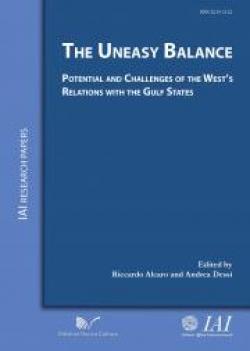The Uneasy Balance. Potential and Challenges of the West's Relations with the Gulf States
A seguito delle rivolte arabe, gli stati del Consiglio di cooperazione del Golfo (Ccg) - Bahrain, Kuwait, Oman, Qatar, Arabia Saudita ed Emirati arabi uniti - hanno notevolmente aumentato il loro coinvolgimento diplomatico, economico e militare nel mondo arabo. Questi stati hanno, con alcune varianti, svolto un ruolo importante nelle trasformazioni politiche in atto in Tunisia, Egitto, Libia, Yemen e Siria, fornendo al tempo stesso un significativo sostegno finanziario e diplomatico alle monarchie arabe di Marocco e Giordania ed esprimendosi con decisione contro un qualsiasi cambiamento politico in Bahrain. A fronte dell'accrescersi del ruolo del Consiglio, Stati Uniti e Unione europea hanno subito una relativa perdita di influenza nella regione, come conseguenza della caduta di alleati arabi di lunga data e della crisi economica. Alla luce di tali sviluppi, nel corso degli ultimi due anni è emersa l'importanza di un rafforzamento delle relazioni tra Occidente e Ccg. Nonostante il permanere di significative possibilità di cooperazione e il sovrapporsi, in alcune zone, di interessi immediati, tale rapporto risulta essere problematico poiché l'Occidente deve bilanciare i propri interessi economici e strategici nella regione con un più generale impegno a sostegno della diffusione della democrazia, dei diritti umani e dello stato di diritto.
Versione rivista e aggiornata dei paper presentati alla quinta edizione del Transatlantic Security Symposium, tenutosi a Roma il 16 novembre 2012.
-
Dati bibliografici
Roma, Nuova Cultura, April 2013, 159 p. -
Numero
8 -
ISBN/ISSN/DOI:
978-88-6812-050-4
List of Contributors
List of Abbreviations
Introduction. The West and the Gulf States at the Dawn of the New Millennium, Riccardo Alcaro, p. 13-31
The Evolving Strategic Outlook of the GCC
The GCC and the Arab Uprisings
The Basis of West-GCC (Partial) Alignment
Conclusion: 'Your Sins Will Come Back to Haunt You'
1. The GCC States and the West: Challenges of Arab Transitions, Christian Koch, p. 33-48
A Changing Regional Balance
The GCC and the West: Convergence amidst Challenges
Conclusion
2. The Arab Spring: the Changing Dynamics of West-GCC Cooperation, Claire Spencer and Jane Kinninmont, p. 49-69
The Global Context for West-GCC Relations
Evolving Responses to the Shock of the Arab Uprisings
Post-2011 Strategies: Still a Work in Progress
Gulf Perceptions of the Colonial Legacy
Western Perceptions of the Gulf States
Conclusion
3. Iran: the Uncertain Basis of the West-GCC Strategic Alignment, Simon Henderson, p. 71-82
Background
The Shape of the GCC
Conclusion
4. Triangulating Iranian-Western-GCC Relations, Rouzbeh Parsi, p. 83-95
Framing the Issue
Iran and West-GCC Relations
Conclusion
5. Combating Unconventional Threats in the Gulf: Convergence and Divergence between the West and the GCC, Frederic Wehrey, p. 97-112
A GCC-Western Convergence: Piracy and Terrorism Threats
Political and Ideological Threats after the Arab Uprisings
Conclusion
6. The Odd Couple: NATO and the GCC, Florence Gaub, p. 113-126
How It All Began: the Backdrop to the Istanbul Cooperation Initiative
In Practice: Cooperation between NATO and the Gulf
Common Threats, but Same Priorities?
Conclusion
Appendix A. NATO's Relations with the Gulf Region, Rolf Schwarz, p. 127-132
Appendix B. Potential and Challenges of EU-US Relations with the Gulf Cooperation Council. Report of the Transatlantic Security Symposium 2012, Andrea Dessì, p. 133-146
Appendix C. List of Participants in the Transatlantic Security Symposium 2012, p. 147-151
Bibliography, p. 153-159
Tema
Tag
Contenuti collegati
-
Evento17/02/2014
Transatlantic security symposium 2012
leggi tutto -
Ricerca30/12/2013
Transatlantic Security Symposium - 5. ed.
leggi tutto




